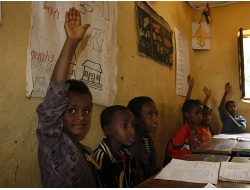No walk in Addis is dull. A multitude of sights, smells and sounds confronts your senses on a daily basis. During a five-minute stroll, you could be approached by a street child trying to sell you a stick for brushing teeth, see a herd of donkeys being led by a man with a whip, and encounter two policemen holding hands. It is common for male friends to publicly show affection in this way, yet the fact that homosexuality is illegal here makes this an even more interesting practice for visitors to witness.
We are gradually getting used to the daily barrage of comments, stares and even attempts to touch us: one girl stroked my hair, apparently whispering to her friends "it's so soft!" Lots of people shout "how are you?", as well as "ferengi", meaning white person.
Despite Addis being considered Africa's diplomatic capital, with many UN agencies having their headquarters here, there are not many 'ferengis' on the streets. They are certainly scarce on the often crowded, dirty and relatively dilapidated minibuses that serve as public transport, which we rely on to travel around the city.

I assume the reason so many people attempt to interact with us is because the vast majority of Ethiopians have never left the country: we therefore appear exotic. Yet this attention is sometimes too invasive. On my first day in the city, a man who was clearly mentally disturbed tried to throw a black bag at me in an aggressive manner. Although these individuals are alarming, we sympathise with them, as there is no adequate healthcare provision for them. They live in rags on the streets, and often talk to themselves.
The slower pace of work here is still extremely frustrating, although some progress has been made. My Ethiopian counterpart and I are starting to teach English classes this week, and are also meeting with some disabled young people, whom we're hoping to help get organised into a club. We want to help them become economically self-sufficient, for instance by grouping together with like-minded individuals to collectively approach microfinance institutions. A loan from these bodies could help the disabled youths establish small businesses. They are certainly a group who desperately need help, as a large proportion of homeless people are physically handicapped.
Our main task, though, is to conduct a baseline survey regarding the English proficiency of secondary school pupils across five sub-cities. We have discussed the best approach to this with some experts at the Ministry of Education, and have started trying to examine secondary sources. We will also collect primary data through questionnaires and interviews with students, teachers and parents, as well as by observing lessons.
Ultimately, the survey will outline which aspects of the students' English need the most improvement. The Addis Ababa Youth Association, which is the organisation most of us volunteers are working with, will then run extra tutorial lessons, specifically focusing on these weaker areas. The project is exciting and certainly worthwhile: I can't wait to fully immerse myself in the work.

Recent Comments